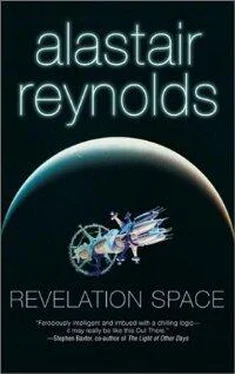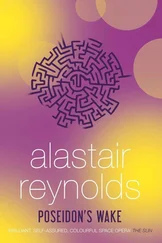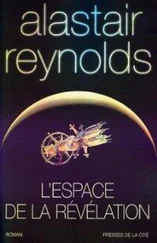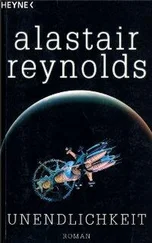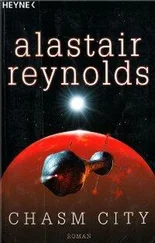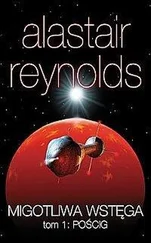“Why have you waited until now to tell us these things?”
“I apologise for my earlier reticence. But first I had to digest the knowledge that the Shrouders had placed in my mind. It was in their terms, you see—not ours.” He hesitated, his attention seemingly drawn to a smudge of chalk which was marring the mathematical purity of his mandala. He licked his finger and rubbed it away. “That was the easy part. Then I had to remember how humans communicate.” Lascaille looked at Sylveste, his animal eyes veiled by a Neanderthal tangle of uncombed hair. “You’ve been kind to me, not like the others. You had patience with me. I thought this might help you.”
Sylveste sensed that this window of lucidity might soon be closing. “How exactly do we persuade the Jugglers to imprint the Shrouder consciousness pattern?”
“That’s the easy part.” He nodded at the chalk drawing. “Memorise this figure, and hold it in mind when you swim.”
“That’s all?”
“It will suffice. The internal representation of this figure in your mind will instruct the Jugglers as to your needs. You’d better take them a gift, of course. They don’t do something of this magnitude for free.”
“A gift?”
Sylveste was wondering what kind of gift one could possibly offer to an entity which resembled a floating island of seaweed and algae.
“You’ll think of something. Whatever it is, make sure it’s information-dense. Otherwise you’ll bore them. You wouldn’t want to bore them.” Sylveste wanted to ask further questions, but Lascaille’s attention had returned to his chalk drawings. “That’s all I have to say,” the man said.
It turned out to be the case.
Lascaille never spoke to Sylveste, or anyone else again. A month later they found him dead, drowned in the fishpond.
“Hello?” Khouri said. “Is there anyone here?”
She had awoken, that was all she knew. Not from a catnap, either, but from something much deeper, longer and colder. A reefersleep fugue, almost certainly—they were not something you forgot, and she had woken from one before, around Yellowstone. The physiological and neural signs were exactly right. There was no sign of a reefersleep casket—she was lying, fully-clothed, on a couch—but someone could easily have moved her before she was properly conscious. Who, though? And where was she? It seemed as if someone had tossed a grenade into her memory, blowing it into frags. The place where she found herself now was only teasingly familiar.
Someone’s hallway? Wherever it was, it was filled with ugly sculptures. She had either walked past these things a matter of hours ago, or else they were recessive figments from the depths of her childhood; nursery horrors. Their curved, jagged and burnt shapes loomed over her, casting demonlike shadows. Groggily she intuited that these things fitted together in some way, or had once done so, though they were perhaps too warped and torn for that now.
Footsteps padded unsteadily across the hallway.
She twisted her head to view the approaching person. Her neck felt stiffer than cured wood. Years of experience had told her that the rest of her body would be no more supple after the sleep fugue.
The man stopped a few paces from her bed. In the moonlight glow of the chamber it was hard to read his features, but there was a familiarity within the shadowed jowliness that tugged at her memory. Someone she had known, many years ago.
“It’s me,” he said, the voice wet and phlegmatic. “Manoukhian. The Mademoiselle thought you might appreciate a familiar face when you woke up.”
The names meant something to her, but exactly what, it was hard to say. “What happened?”
“Simple. She made you an offer you couldn’t refuse.”
“How long have I been asleep?”
“Twenty-two years,” Manoukhian said, offering her a hand. “Now, shall we go and see the Mademoiselle?”
Sylveste woke facing a wall of black which swallowed half the sky—a black so total that it seemed like a nullification of existence itself. He had never noticed it before, but now he saw—or imagined he saw—that the ordinary darkness between the stars was in fact aglow with its own milky luminosity. But there were no stars in the circular pool of emptiness which was Lascaille’s Shroud; no source of any light whatsoever, no photons arriving from any part of the detectable electromagnetic spectrum; no neutrinos of any flavour, no particles, exotic or otherwise. No gravity waves, electrostatic or magnetic fields—not even the slight whisper of Hawking radiation which, according to the few extant theories of Shroud mechanics, ought to be bleeding out of the boundary, reflecting the entropic temperature of the surface.
None of these things happened. The only thing a Shroud did—so far as anyone had ever been able to tell—was to comprehensively obstruct all forms of radiation attempting to pass through it. That, of course, and the other thing: which was to shred any object daring to pass too close to its boundary.
They had woken him from reefersleep, and now he was in the state of sickening disorientation which accompanied the crash revival, yet young enough to weather the effects: his physiological age was only thirty-three, despite the fact that more than sixty years had passed since his birth.
“Am I… all right?” he struggled to ask the revival medicos, while all the time his attention was being snared by the nothingness beyond the station window, like someone staring into the black counterpart of a snowstorm.
“You’re almost clear,” said the medico next to him, watching neural readouts scroll through midair, digesting their import with quiet taps of a stylus against his lower lip. “But Valdez faded. That means Lefevre’s bumped up to primary. Think you can work with her?”
“Bit late for doubts now, isn’t it?”
“It’s a joke, Dan. Now, how much do you remember? Revival amnesia’s the one thing I haven’t scanned for.”
It seemed like a stupid question, but as soon as he interrogated his memory, he found it responding sluggishly, like a document retrieval system in an inefficient bureaucracy.
“Do you remember Spindrift?” the medico asked, with a note of concern in his voice. “It’s vital that you remember Spindrift…”
He remembered it, yes—but for a moment he could not connect it with any other memories. What he remembered—the last thing he remembered which was not adrift—was Yellowstone. They left it twelve years after the Eighty; twelve years after Calvin’s corporeal death; twelve years after Philip Lascaille had spoken to Sylveste; twelve years after the man had drowned himself, his purpose seemingly fulfilled.
The expedition was small but well equipped—a lighthugger crew, partially chimeric, Ultranauts who seldom mingled with the other humans; twenty scientists largely culled from SISS, and four potential contact delegates. Only two of the four would actually travel to the surface of the Shroud.
Lascaille’s Shroud was their objective, but not their first port of call. Sylveste had heeded what Lascaille had told him; the Pattern Jugglers were vital to the success of his mission. It was first necessary to visit them on their own world, tens of light-years from the Shroud. Even then Sylveste had little idea of what to expect. But, rash as it seemed, he trusted Lascaille’s advice. The man would not have broken his silence for nothing.
The Jugglers had been a curiosity for more than a century. They existed on a number of worlds, all of them dominated by single planet-sized oceans. The Jugglers were a biochemical consciousness distributed through each ocean, composed of trillions of co-acting micro-organisms, arranged into island-sized clumps. All the Jugglers’ worlds were tectonically active, and it was theorised that the Jugglers drew their energy from hydrothermal outlet vents on the seabed; that the heat was converted to bioelectrical energy and transferred to the surface via tendrils of organic superconductor draping down through kilometres of black cold. The Jugglers’ purpose—assuming they had a purpose—remained completely unknown. It was clear that they had the ability to mediate the biospheres of the worlds in which they had been seeded, acting like a single, intelligently acting mass of phytoplankton—but no one knew if this was merely secondary to some hidden, higher function. What was known—and again not properly understood—was that the Jugglers had the capacity to store and retrieve information, acting like a single, planet-wide neural net. This information was stored on many levels, from the gross connectivity patterns of surface-floating tendrils, down to free-floating strands of RNA. It was impossible to say where the oceans began and the Jugglers ended—just as it was impossible to say whether each world contained many Jugglers or merely one arbitrarily extended individual, for the islands themselves were linked by organic bridges. They were world-sized living repositories of information; vast informational sponges. Almost anything entering a Juggler ocean would be penetrated by microscopic tendrils, partially dissolved, until its structural and chemical properties had been revealed, and that information would then be passed into the biochemical storage of the ocean itself. As Lascaille had intimated, the Jugglers could imprint these patterns as well as encode them. Supposedly those patterns could include the mentalities of other species which had come into contact with the Jugglers—such as the Shrouders.
Читать дальше
